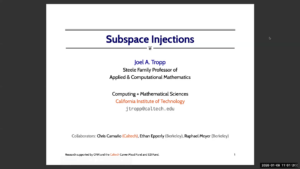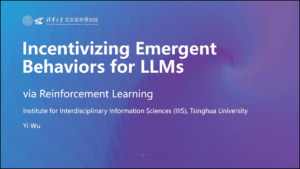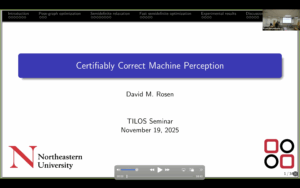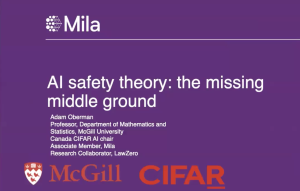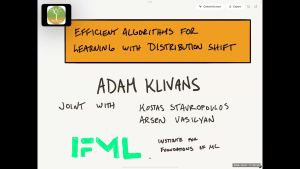Randomized Linear Algebra with Subspace Injections
Joel Tropp, Caltech
To achieve the greatest possible speed, practitioners regularly implement randomized algorithms for low-rank approximation and least-squares regression with structured dimension reduction maps. This talk outlines a new perspective on structured dimension reduction, based on the injectivity properties of the dimension reduction map. This approach provides sharper bounds for sparse dimension reduction maps, and it leads to exponential improvements for tensor-product dimension reduction. Empirical evidence confirms that these types of structured random matrices offer exemplary performance for a range of synthetic problems and contemporary scientific applications.
Joint work with Chris Camaño, Ethan Epperly, and Raphael Meyer; available at https://arxiv.org/abs/2508.21189.
Joel A. Tropp is Steele Family Professor of Applied & Computational Mathematics at the California Institute of Technology. His research centers on applied mathematics, machine learning, data science, numerical algorithms, and random matrix theory. Some of his best-known contributions include matching pursuit algorithms, randomized SVD algorithms, matrix concentration inequalities, and statistical phase transitions. Prof. Tropp attained the Ph.D. degree in Computational Applied Mathematics at the University of Texas at Austin in 2004, and he joined Caltech in 2007. He won the PECASE in 2008, and he was recognized as a Highly Cited Researcher in Computer Science each year from 2014–2018. He is co-founder of the SIAM Journal on Mathematics of Data Science (SIMODS), and he was co-chair of the inaugural 2020 SIAM Conference on the Mathematics of Data Science. Prof. Tropp was elected SIAM Fellow in 2019, IEEE Fellow in 2020, and IMS Fellow in 2024. He received the 2025 Richard P. Feynman Prize for Excellence in Teaching at Caltech. He is an invited speaker at the 2026 International Congress of Mathematicians (ICM).
Incentivizing Emergent Behaviors for LLMs via Reinforcement Learning
Yi Wu, Tsinghua University
Reinforcement Learning (RL) has become a powerful post-training method for eliciting advanced behaviors in large language models (LLMs). This talk presents recent results showing how RL can incentivize the emergence of LLM capabilities across three domains: (1) multi-player deduction game, Werewolf, where RL-trained LLM agents develop strategic behaviors and outperform strong human players; (2) agentic search, where large-scale RL enables a 32B model to run multi-step search to answer non-trivial questions beyond commercial baselines; and (3) efficient reasoning, where RL mitigates over-thinking and improves both reliability and compute efficiency.
The papers can be found at
- Werewolf: https://arxiv.org/abs/2310.
18940 (ICML24), https://arxiv.org/abs/2502. 04686 (ICML25) - ASearcher: https://arxiv.org/abs/2508.
07976 - Thinking Efficiency: https://www.arxiv.org/abs/
2506.07104 (NeurIPS25)
All the projects are trained using our large-scale agentic RL system, AReaL, which is open-source at https://github.com/
Yi Wu is an assistant professor at the Institute for Interdisciplinary Information Sciences (IIIS), Tsinghua University. He obtained his Ph.D. from UC Berkeley and was a researcher at OpenAI from 2019 to 2020. His research focuses on reinforcement learning, multi-agent learning, and LLM agents. His representative works include the value iteration network, the MADDPG/MAPPO algorithm, OpenAI’s hide-and-seek project, and the AReaL project. He received the best paper award at NIPS 2016, the best demo award finalist at ICRA 2024, and MIT TR35 Asia Pacific 2025 award.
Stochastic-Gradient and Diagonal-Scaling Algorithms for Constrained Optimization and Learning
Frank E. Curtis, Lehigh University
I will motivate and provide an overview of recent efforts in my research group on the design and analysis of stochastic-gradient-based algorithms for solving constrained optimization problems. I will focus in particular on our motivation for informed supervised learning, where constraints in the training problem can be used to impose prior knowledge on the properties that should be possessed by a trained prediction model. In addition, I will provide a detailed look at our newest extensions of heavy-ball and Adam schemes from the unconstrained to the equality-constrained setting, for which we have shown state-of-the-art convergence guarantees. I will demonstrate the impressive practical performance of our methods using a few informed supervised learning problems.
Frank E. Curtis is a Professor in the Department of Industrial and Systems Engineering at Lehigh University, where he has been employed since 2009. He received a bachelor’s degree from the College of William and Mary in 2003 with a double major in Computer Science and Mathematics, received a master’s degree in 2004 and Ph.D. degree in 2007 from the Department of Industrial Engineering and Management Science at Northwestern University, and spent two years as a Postdoctoral Researcher in the Courant Institute of Mathematical Sciences at New York University from 2007 until 2009. His research focuses on the design, analysis, and implementation of numerical methods for solving large-scale nonlinear optimization problems. He received an Early Career Award from the Advanced Scientific Computing Research (ASCR) program of the U.S. Department of Energy (DoE), and has received funding from various programs of the U.S. National Science Foundation (NSF), including through a TRIPODS Phase I grant awarded to him and his collaborators at Lehigh, Northwestern, and Boston University. He has also received funding from the U.S. Office of Naval Research (ONR) and DoE’s Advanced Research Projects Agency-Energy (ARPA-E). He received, along with Leon Bottou (Meta AI) and Jorge Nocedal (Northwestern), the 2021 SIAM/MOS Lagrange Prize in Continuous Optimization. He was awarded, with James V. Burke (U. of Washington), Adrian Lewis (Cornell), and Michael Overton (NYU), the 2018 INFORMS Computing Society Prize. He and team members Daniel Molzahn (Georgia Tech), Andreas Waechter (Northwestern), Ermin Wei (Northwestern), and Elizabeth Wong (UC San Diego) were awarded second place in the ARPA-E Grid Optimization Competition in 2020. He currently serves as Area Editor for Continuous Optimization for Mathematics of Operations Research and serves as an Associate Editor for Mathematical Programming, SIAM Journal on Optimization, Operations Research, IMA Journal of Numerical Analysis, and Mathematical Programming Computation. He previously served as the Vice Chair for Nonlinear Programming for the INFORMS Optimization Society, and is currently very active in professional societies and groups related to mathematical optimization, including INFORMS, the Mathematics Optimization Society, and the SIAM Activity Group on Optimization.
Training Neural Networks at Any Scale
Volkan Cevher, EPFL
At the heart of deep learning’s transformative impact lies the concept of scale–encompassing both data and computational resources, as well as their interaction with neural network architectures. Scale, however, presents critical challenges, such as increased instability during training and prohibitively expensive model-specific tuning. Given the substantial resources required to train such models, formulating high-confidence scaling hypotheses backed by rigorous theoretical research has become paramount.
To bridge theory and practice, the talk explores a key mathematical ingredient of scaling in tandem with scaling theory: the numerical solution algorithms commonly employed in deep learning, spanning domains from vision to language models. We unify these algorithms under a common master template, making their foundational principles transparent. In doing so, we reveal the interplay between adaptation to smoothness structures via online learning and the exploitation of optimization geometry through non-Euclidean norms. Our exposition moves beyond simply building larger models–it emphasizes strategic scaling, offering insights that promise to advance the field while economizing on resources.
Volkan Cevher received the B.Sc. (valedictorian) in electrical engineering from Bilkent University in Ankara, Turkey, in 1999 and the Ph.D. in electrical and computer engineering from the Georgia Institute of Technology in Atlanta, GA in 2005. He was a Research Scientist with the University of Maryland, College Park from 2006-2007 and also with Rice University in Houston, TX, from 2008-2009. Currently, he is an Associate Professor at the Swiss Federal Institute of Technology Lausanne and a Faculty Fellow in the Electrical and Computer Engineering Department at Rice University. His research interests include machine learning, signal processing theory, optimization theory and methods, and information theory. Dr. Cevher is an ELLIS fellow and was the recipient of the Google Faculty Research award in 2018, the IEEE Signal Processing Society Best Paper Award in 2016, a Best Paper Award at CAMSAP in 2015, a Best Paper Award at SPARS in 2009, and an ERC CG in 2016 as well as an ERC StG in 2011.
95 Percent: Bridging the Gap Between Prototype and Product
Jeremy Schwartz, Zoox
When transitioning from the academic world to the professional world of engineering, one of the most common pitfalls is failing to understand the difference between a compelling prototype and a successful product. This talk will focus on that distinction. We will discuss the differences between them, and the work required to evolve a good prototype into a real product. We will also discuss some common pitfalls encountered in product development, and some of the practical software design considerations to keep in mind for development of robust, mature code. The talk will include examples from my background developing robotic systems for air, space, and ground.
Jeremy Schwartz is a robotics engineer at Zoox with expertise in a wide variety of areas of mechanical and electrical engineering and computer science. His primary professional expertise is in autonomy and behavioral algorithms, and he has worked in the aerospace industry as well as ground robotics, specializing in autonomous systems of all kinds.
Certifiably Correct Machine Perception
David Rosen, Northeastern University
Many fundamental machine perception and state estimation tasks require the solution of a high-dimensional nonconvex estimation problem; this class includes (for example) the fundamental problems of simultaneous localization and mapping (in robotics), 3D reconstruction (in computer vision), and sensor network localization (in distributed sensing). Such problems are known to be computationally hard in general, with many local minima that can entrap the smooth local optimization methods commonly applied to solve them. The result is that standard machine perception algorithms (based upon local optimization) can be surprisingly brittle, often returning egregiously wrong answers even when the problem to which they are applied is well-posed.
In this talk, we present a novel class of certifiably correct estimation algorithms that are capable of efficiently recovering provably good (often globally optimal) solutions of generally-intractable machine perception problems in many practical settings. Our approach directly tackles the problem of nonconvexity by employing convex relaxations whose minimizers provide provably good approximate solutions to the original estimation problem under moderate measurement noise. We illustrate the design of this class of methods using the fundamental problem of pose-graph optimization (a mathematical abstraction of robotic mapping) as a running example. We conclude with a brief discussion of open questions and future research directions.
David M. Rosen is an Assistant Professor in the Departments of Electrical & Computer Engineering and Mathematics and the Khoury College of Computer Sciences (by courtesy) at Northeastern University, where he leads the Robust Autonomy Laboratory (NEURAL). Prior to joining Northeastern, he was a Research Scientist at Oculus Research (now Meta Reality Labs) from 2016 to 2018, and a Postdoctoral Associate at MIT’s Laboratory for Information and Decision Systems (LIDS) from 2018 to 2021. He holds the degrees of B.S. in Mathematics from the California Institute of Technology (2008), M.A. in Mathematics from the University of Texas at Austin (2010), and ScD in Computer Science from the Massachusetts Institute of Technology (2016).
He is broadly interested in the mathematical and algorithmic foundations of trustworthy machine perception, learning, and control. His work has been recognized with the IEEE Transactions on Robotics Best Paper Award (2024), an Honorable Mention for the IEEE Transactions on Robotics Best Paper Award (2021), a Best Student Paper Award at Robotics: Science and Systems (2020), a Best Paper Award at the International Workshop on the Algorithmic Foundations of Robotics (2016), and selection as an RSS Pioneer (2019).
AI Safety Theory: The Missing Middle Ground
Adam Oberman, McGill University
Over the past few years, the capabilities of generative artificial intelligence (AI) systems have advanced rapidly. Along with the benefits of AI, there is also a risk of harm. In order to benefit from AI while mitigating the risks, we need a grounded theoretical framework.
The current AI safety theory, which predates generative AI, is insufficient. Most theoretical AI safety results tend to reason absolutely: a system is a system is “aligned” or “mis-aligned”, “honest” or “dishonest”. But in practice safety is probabilistic, not absolute. The missing middle ground is a quantitative or relative theory of safety — a way to reason formally about degrees of safety. Such a theory is required for defining safety and harms, and is essential for technical solutions as well as for making good policy decisions.
In this talk I will:
- Review current AI risks (from misuse, from lack of reliability, and systemic risks to the economy) as well as important future risks (lack of control).
- Review theoretical predictions of bad AI behavior and discuss experiments which demonstrate that they can occur in current LLMs.
- Explain why technical and theoretical safety solutions are valuable, even by contributors outside of the major labs.
- Discuss some gaps in the theory and present some open problems which could address the gaps.
Adam Oberman is a Full Professor of Mathematics and Statistics at McGill University, a Canada CIFAR AI Chair, and an Associate Member of Mila. He is a research collaborator at LawZero, Yoshua Bengio’s AI Safety Institute. He has been researching AI safety since 2024. His research spans generative models, reinforcement learning, optimization, calibration, and robustness. Earlier in his career, he made significant contributions to optimal transport and nonlinear partial differential equations. He earned degrees from the University of Toronto and the University of Chicago, and previously held faculty and postdoctoral positions at Simon Fraser University and the University of Texas at Austin.
High-dimensional Optimization with Applications to Compute-Optimal Neural Scaling Laws
Courtney Paquette (McGill University)
Given the massive scale of modern ML models, we now only get a single shot to train them effectively. This restricts our ability to test multiple architectures and hyper-parameter configurations. Instead, we need to understand how these models scale, allowing us to experiment with smaller problems and then apply those insights to larger-scale models. In this talk, I will present a framework for analyzing scaling laws in stochastic learning algorithms using a power-law random features model (PLRF), leveraging high-dimensional probability and random matrix theory. I will then use this scaling law to address the compute-optimal question: How should we choose model size and hyper-parameters to achieve the best possible performance in the most compute-efficient manner? Then using this PLRF model, I will devise a new momentum-based algorithm that (provably) improves the scaling law exponent. Finally, I will present some numerical experiments on LSTMs that show how this new stochastic algorithm can be applied to real data to improve the compute-optimal exponent.
Courtney Paquette is an assistant professor at McGill University in the Mathematics and Statistics department, a CIFAR AI Chair (MILA), and an active member of the Montreal Machine Learning Optimization Group (MTL MLOpt) at MILA. Her research broadly focuses on designing and analyzing algorithms for large-scale optimization problems, motivated by applications in data science, and using techniques that draw from a variety of fields, including probability, complexity theory, and convex and nonsmooth analysis. Dr. Paquette is a lead organizer of the OPT-ML Workshop at NeurIPS since 2020, and a lead organizer (and original creator) of the High-dimensional Learning Dynamics (HiLD) Workshop at ICML.
A New Paradigm for Learning with Distribution Shift
Adam Klivans, UT Austin
We revisit the fundamental problem of learning with distribution shift, where a learner is given labeled samples from training distribution D, unlabeled samples from test distribution D′ and is asked to output a classifier with low test error. The standard approach in this setting is to prove a generalization bound in terms of some notion of distance between D and D′. These distances, however, are difficult to compute, and this has been the main stumbling block for efficient algorithm design over the last two decades.
We sidestep this issue and define a new model called TDS learning, where a learner runs a test on the training set and is allowed to reject if this test detects distribution shift relative to a fixed output classifier. This approach leads to the first set of efficient algorithms for learning with distribution shift that do not take any assumptions on the test distribution. Finally, we discuss how our techniques have recently been used to solve longstanding problems in supervised learning with contamination.
Adam Klivans is a Professor of Computer Science at the University of Texas at Austin and Director of the NSF AI Institute for Foundations of Machine Learning (IFML). His research interests lie in machine learning and theoretical computer science, in particular, Learning Theory, Computational Complexity, Pseudorandomness, Limit Theorems, and Gaussian Space. Dr. Klivans is a recipient of the NSF CAREER Award and serves on the editorial board for the Theory of Computing and Machine Learning Journal.
Flat Minima and Generalization: from Matrix Sensing to Neural Networks
Maryam Fazel, University of Washington
When do overparameterized neural networks avoid overfitting and generalize to unseen data? Empirical evidence suggests that the shape of the training loss function near the solution matters—the minima where the loss is “flatter” tend to lead to better generalization. Yet quantifying flatness and its rigorous analysis, even in simple models, has been limited. In this talk, we examine overparameterized nonconvex models such as low-rank matrix sensing, matrix completion, robust PCA, as well as a 2-layer neural network as test cases. We show that under standard statistical assumptions, "flat" minima (minima with the smallest local average curvature, measured by the trace of the Hessian matrix) provably generalize in all these cases. These algorithm-agnostic results suggest a theoretical basis for favoring methods that bias iterates towards flat solutions, and help inform the design of better training algorithms.
Hunting the Hessian
Madeleine Udell, Stanford University
Ill conditioned loss landscapes are ubiquitous in machine learning, and they slow down optimization. Preconditioning the gradient to make the loss more isotropic is a natural solution, but is challenging for extremely large problems, as direct access to the problem Hessian is prohibitively expensive. We present two fresh approaches to preconditioning using tools from randomized numerical linear algebra and online convex optimization for efficient access to Hessian information, motivated by the question: what is the most useful information we can query from the problem Hessian using linear memory and compute?
One Small Step, One Giant Leap: From Test-Time Tweaks to Global Guarantees
Mahdi Soltanolkotabi, USC
Simple first-order methods like Gradient Descent (GD) remain foundational to modern machine learning. Yet, despite their widespread use, our theoretical understanding of the GD trajectory—how and why it works—remains incomplete in both classical and contemporary settings. This talk explores new horizons in understanding the behavior and power of GD across two distinct but connected fronts.
In the first part, we examine the surprising power of a single gradient step in enhancing model reasoning. We focus on test-time training (TTT)—a gradient-based approach that adapts model parameters using individual test instances. We introduce a theoretical framework that reveals how TTT can effectively handle distribution shifts and significantly reduce the data required for in-context learning, shedding light on why such simple methods often outperform expectations.
The second part turns to a more classical optimization setting: learning shallow neural networks with GD. Despite extensive study, even fitting a one-hidden-layer model to basic target functions lacks rigorous performance guarantees. We present a comprehensive analysis of the GD trajectory in this regime, showing how it avoids suboptimal stationary points and converges efficiently to global optima. Our results offer new theoretical foundations for understanding how GD succeeds in the presence of sub-optimal stationary points.
The Wisdom of the Body Revisited
Benjamin Recht, UC Berkeley
In 1932, Walter Cannon published his seminal text, The Wisdom of the Body, introducing the notion of homeostasis. He conceived of the body as a complex system actively working to keep itself in a stable state despite adversarial engagement with an uncertain and dangerous environment. Cannon’s concept of homeostasis would not only revolutionize the way we think about medicine but also inspire cyberneticists and early artificial intelligence researchers to think about the body and brain as well-regulated machines.
In this talk, I refocus Canon's work under a contemporary lens, showing how non-neural biological networks do very smart things. I will describe concepts from feedback control that illuminate necessary architectures for homeostasis. I will show how such systems can be both resilient to most disturbances while fragile to specific adversarial vectors. Identifying these fragilities can guide positive interventions that can steer dysregulated systems back to stable behavior. Throughout, I aim to highlight the role of mathematical and qualitative theory in our understanding and optimization of systems that behave effectively in unknown futures.
Accelerating Nonconvex Optimization via Online Learning
Aryan Mokhtari, UT Austin
A fundamental problem in optimization is finding an ε-first-order stationary point of a smooth function using only gradient information. The best-known gradient query complexity for this task, assuming both the gradient and Hessian of the objective function are Lipschitz continuous, is O( ε^(−7/4) ). In this talk, I present a method with a gradient complexity of O( d^(1/4) ε^(−13/8) ), where d is the problem dimension—yielding improved complexity when d = O( ε^(−1/2) ). The proposed method builds on quasi-Newton ideas and operates by solving two online learning problems under the hood.
The Binary Iterative Hard Thresholding Algorithm
Arya Mazumdar, TILOS & UC San Diego
We will discuss our work on the convergence of iterative hard threshold algorithms for sparse signal recovery problems. For classification problems with nonseparable data this algorithm can be thought of minimizing the so-called ReLU loss. It seems to be very effective (statistically optimal, simple iterative method) for a large class of models of nonseparable data—sparse generalized linear models. It is also robust to adversarial perturbation. Based on joint work with Namiko Matsumoto.
Reverse diffusion Monte Carlo
Yian Ma, TILOS & UC San Diego
I will introduce a novel Monte Carlo sampling approach that uses the reverse diffusion process. In particular, the intermediary updates—the score functions—can be explicitly estimated to arbitrary accuracy, leading to an unbiased Bayesian inference algorithm. I will then discuss how to use this idea to improve sampling in the diffusion models via reverse transition kernels.
Linear Bregman Divergence Control
Babak Hassibi, Caltech
In the past couple of decades, the use of "non-quadratic" convex cost functions has revolutionized signal processing, machine learning, and statistics, allowing one to customize solutions to have desired structures and properties. However, the situation is not the same in control where the use of quadratic costs still dominates, ostensibly because determining the "value function", i.e., the optimal expected cost-to-go, which is critical to the construction of the optimal controller, becomes computationally intractable as soon as one considers general convex costs. As a result, practitioners often resort to heuristics and approximations, such as model predictive control that only looks a few steps into the future. In the quadratic case, the value function is easily determined by appealing to certainty-equivalence and solving Riccati equations. In this talk, we consider a special class of convex cost functions constructed from Bregman divergence and show how, with appropriate choices, they can be used to fully extend the framework developed for the quadratic case. The resulting optimal controllers are infinite horizon, come with stability guarantees, and have state-feedback, or estimated state-feedback, laws. They exhibit a much wider range of behavior than their quadratic counterparts since the feedback laws are nonlinear. We demonstrate the applicability of the approach to several cases of interest, including safety control, sparse control, and bang-bang control.
Unleashing the Power of Variance Reduction for Training Large Models
Quanquan Gu, Caltech
Training deep neural networks—and more recently, large language models demands efficient and scalable optimizers. Adaptive gradient algorithms like Adam, AdamW, and their variants have been central to this task. Despite the development of numerous variance reduction algorithms in the past decade aimed at accelerating stochastic optimization in both convex and nonconvex settings, variance reduction has not found widespread success in training deep neural networks or large language models. Consequently, it has remained a less favored approach in modern AI. In this talk, I will introduce a unified optimization framework, MARS (Make vAriance Reduction Shine), which reconciles preconditioned gradient methods with variance reduction via a scaled stochastic recursive momentum technique. Within this framework, I will introduce three instances of MARS that leverage preconditioned gradient updates based on AdamW, Lion, and Shampoo, respectively. In addition, I will draw a connection between our algorithms and existing optimizers. Experimental results on training GPT-2 models indicate that MARS consistently outperforms AdamW by a large margin.
Optimization and Reasoning
Sicun (Sean) Gao, TILOS & UC San Diego
For a while, the remarkable progress in ML/AI has led many to dismiss the old-fashioned concerns of NP-hardness, with the belief that sufficiently large nonlinear functions can be trained to encode solutions to everything of practical relevance. Yet, as these functions are increasingly deployed as black-box models with agency, their usability is once again constrained by our ability to answer fundamental questions that demand deeper understanding across the entire training and inference pipeline. These questions inevitably correspond to solving NP-hard problems that remain well beyond the reach of existing algorithms. The formal reasoning community has spent decades developing a rich arsenal of tools for tackling similar problems, but mostly for discrete symbolic computing systems. Extending the same rigor and algorithmic power to the continuous domain is a grand challenge that has to be confronted. We need to unify optimization and reasoning towards new generations of capable algorithms that bring together numerical/analytic, combinatorial/algebraic, and statistical/probabilistic approaches. Addressing these challenges can establish new computational foundations for all real-world engineering disciplines too.
The Architecture of Intelligence
John Doyle, Caltech
The vast diversity of organisms and machines that show even minimal “intelligence” from bacteria to humans to the latest LLMs, nevertheless share a universal architecture involving layers, levels, and laws, or ULA for short. We will discuss the most important features of ULAs, which are Diversity-enable Sweet Spots (DeSS), efficiency-speed-accuracy constraints, tradeoffs, and conservation laws, and “constraints that deconstrain.” Depending on interest, motivating case studies can come from biology, neuroscience, medicine, and technology, with language offering a timely, familiar, fun, and controversial subject. Much of the relevant math is relatively new and will be sketched with links to publications. Most of it can be viewed as applications of optimization to control, networks, and “intelligence.”

